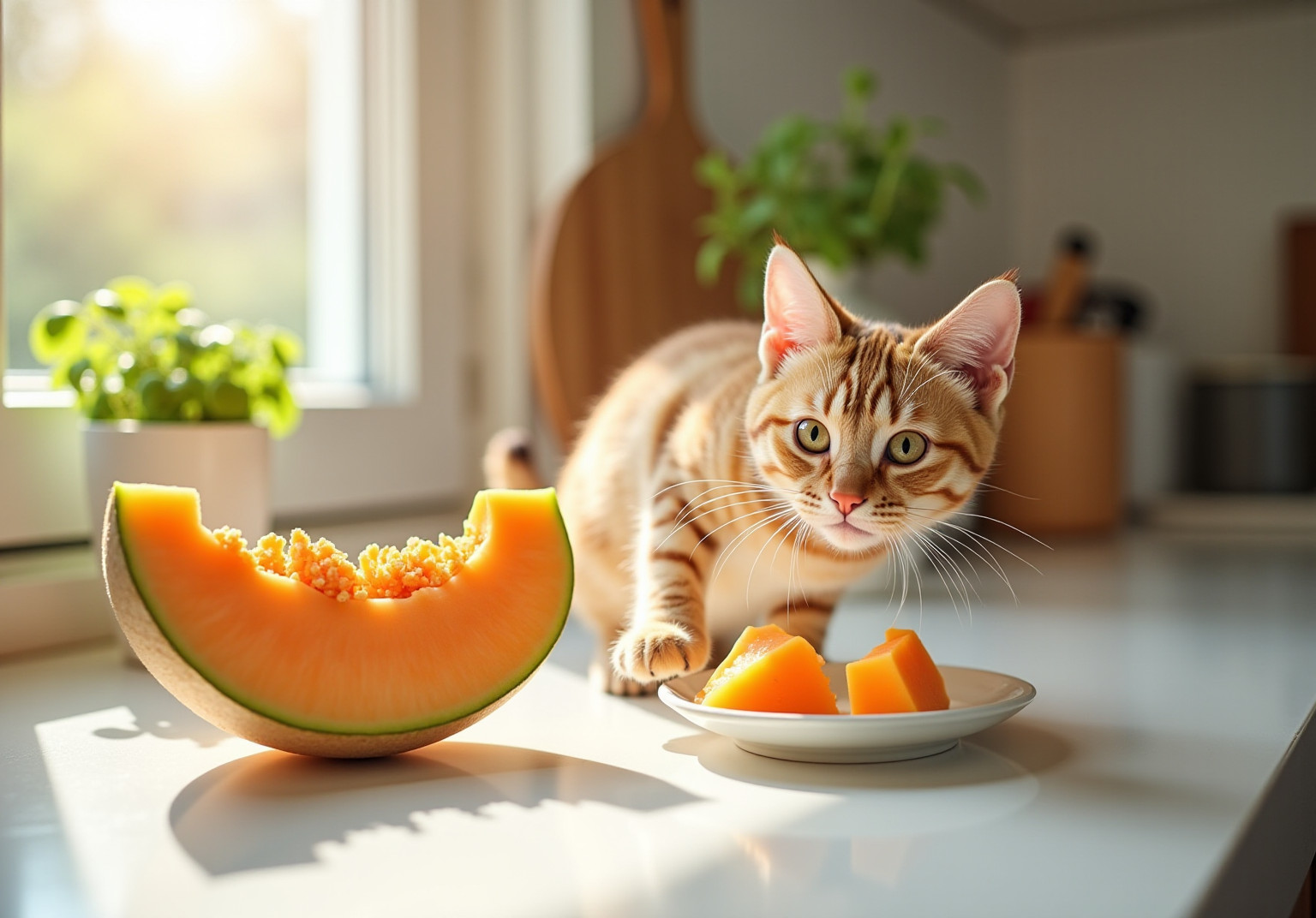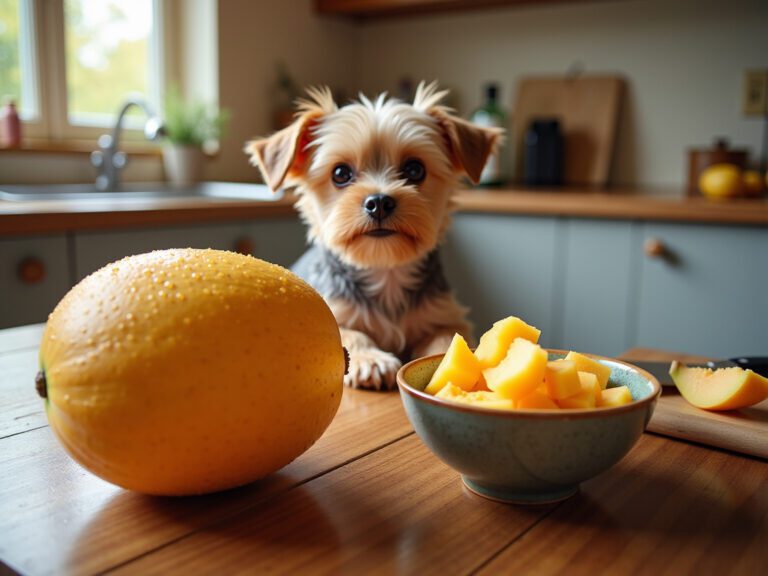Can Cats Eat Cantaloupe? Safety and Benefits Explained
Overview
As a loving pet owner, you might wonder if your furry family members can enjoy a tasty treat like cantaloupe. The good news is that cats can safely eat cantaloupe in moderation! Just be sure to remove the seeds and rind, as these parts can pose choking hazards and digestive issues.
Cantaloupe is not just a delicious snack; it also offers hydration and essential vitamins that can benefit your cat’s health. However, it’s important to remember that moderation is key. Due to its high sugar content, too much cantaloupe can affect your cat’s well-being.
At Adventure Den, we understand the importance of nurturing your pets with care. By incorporating healthy treats like cantaloupe into their diet, you can contribute to their happiness and health. Just keep an eye on portion sizes, and your feline friend can enjoy this refreshing fruit safely!
Introduction
Cantaloupe, a sweet and hydrating melon, often raises a heartfelt question among pet owners: can our beloved cats enjoy cantaloupe? With its high water content and rich nutritional profile, this fruit offers a delightful opportunity to enhance the diets of our furry family members. However, while presenting a refreshing treat might seem harmless, we must consider the potential risks associated with its high sugar content and the importance of careful preparation.
Can our feline friends truly benefit from this juicy snack, or does it hold hidden dangers? By exploring the safety and health implications of cantaloupe for cats, we uncover essential insights that can guide us in providing a nurturing environment for our pets.
Define Cantaloupe: Characteristics and Nutritional Profile
Cantaloupe, scientifically known as Cucumis melo, is a delightful type of melon that many pet owners may ask, can cats eat cantaloupe for their furry family members? Characterized by its sweet, orange flesh and netted skin, this refreshing treat boasts a high water content of approximately 90%, making it a perfect snack for hydration.
As you care for your pets, it’s comforting to know that cantaloupe is low in calories, with just about 53 calories per cup. It is rich in essential vitamins A and C, which play a vital role in maintaining healthy skin and vision in your beloved cats. Additionally, this melon contains dietary fiber, potassium, and antioxidants, all contributing to their overall health and well-being.
Imagine offering your pet a slice of this juicy melon, knowing that you are providing not just a tasty treat but also a boost to their health. At Adventure Den, we understand the importance of nurturing your pets with wholesome options. So, why not consider adding cantaloupe to their diet if you’re curious about can cats eat cantaloupe? It’s a simple way to show your love and care for their health!
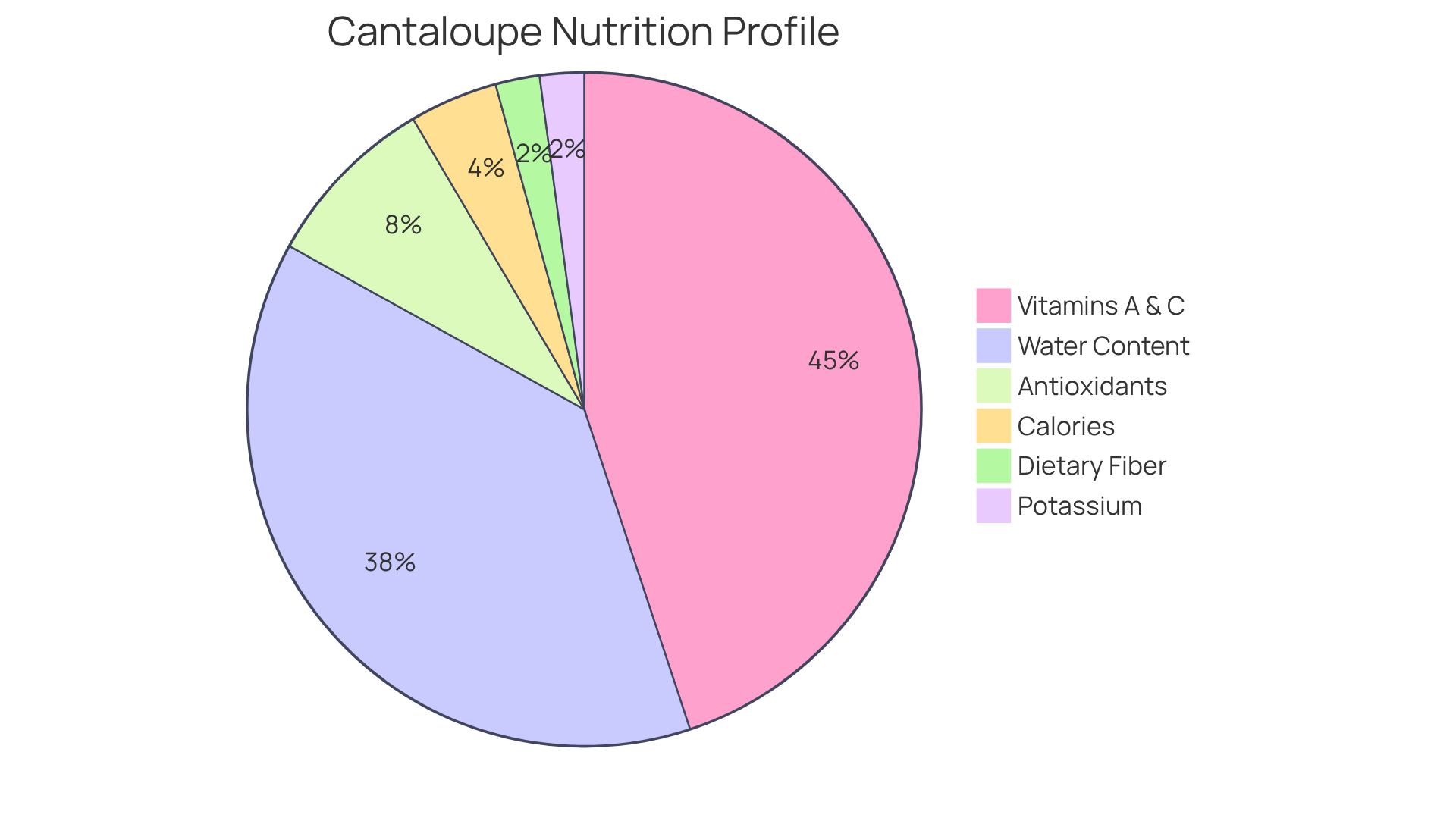
Assess Safety: Can Cats Eat Cantaloupe?
Cats can safely enjoy melon, but when considering if can cats eat cantaloupe, it’s important to offer it in moderation. When considering if can cats eat cantaloupe, it’s important to note that the flesh of the cantaloupe is safe for your furry family members, provided that both the seeds and rind are removed. These parts can pose choking hazards and lead to gastrointestinal issues. Cantaloupe is hydrating and contains substantial fiber, which aids in digestion, and many wonder if can cats eat cantaloupe. However, pet owners should be mindful of the fruit’s high sugar content when considering if can cats eat cantaloupe, as it can disrupt a cat’s metabolism and contribute to weight gain, particularly in cats with existing health concerns like diabetes.
When considering whether can cats eat cantaloupe, it is advisable to introduce it gradually into your cat’s diet to monitor for any adverse reactions, such as vomiting or lethargy. Veterinarians, including Maja Platisa, encourage pet owners to consult with their veterinarian about their cat’s dietary needs and to ask if can cats eat cantaloupe, ensuring that melon is provided as an occasional snack. It’s also vital to wash melons thoroughly before offering them to your cat to remove any pesticides. By following these guidelines, you can ensure that this fruit becomes a safe and enjoyable snack for your feline, which raises the question of can cats eat cantaloupe, while supporting hydration and digestive well-being when offered correctly. Always observe your cat for any unusual signs after feeding them melon, as this attentiveness is part of creating a nurturing environment for your beloved pet.
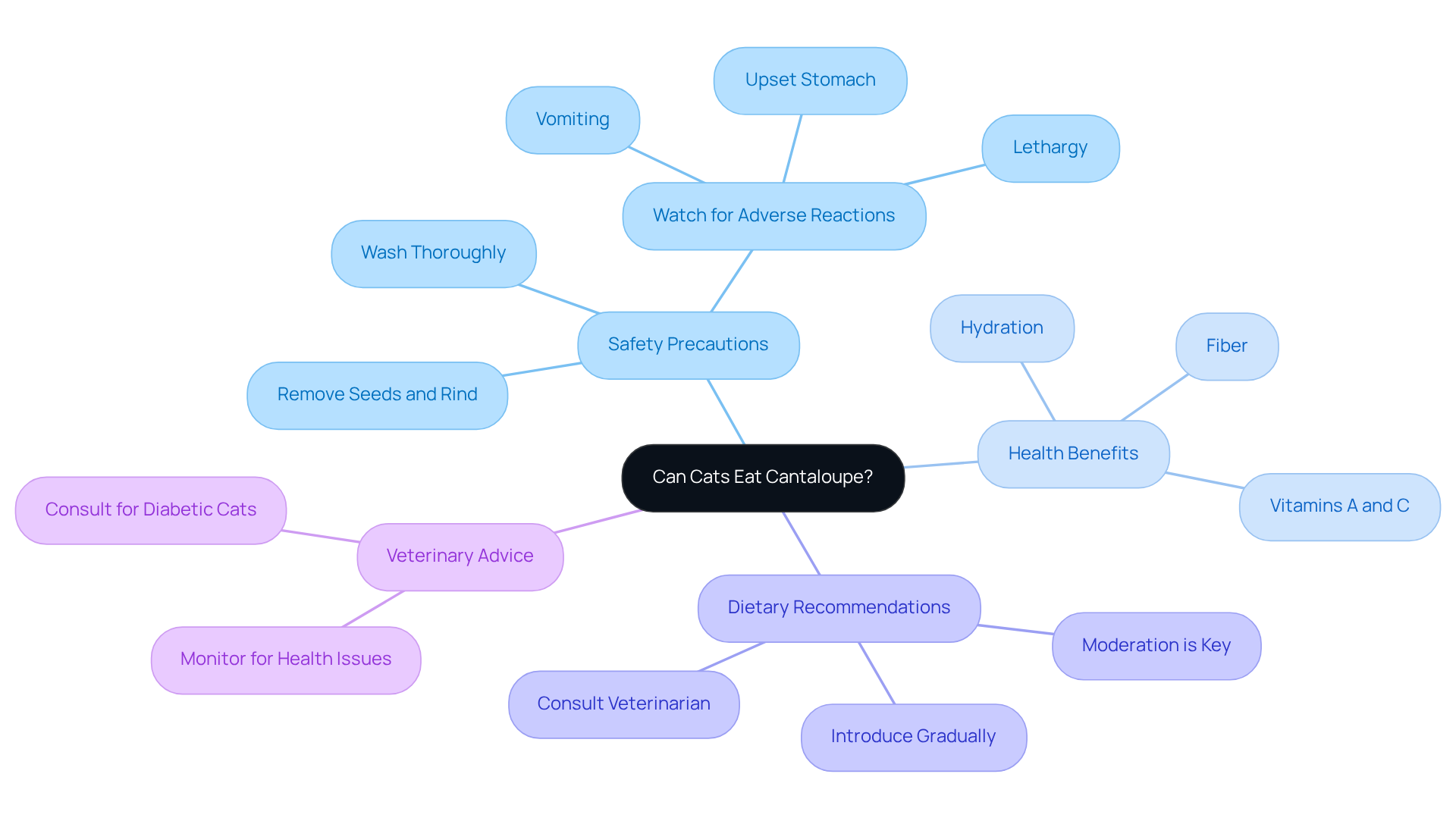
Explore Nutritional Benefits: Cantaloupe as a Treat for Cats
Cantaloupe can be a wonderful treat for your furry family members, leading to the question of whether can cats eat cantaloupe, as it offers a range of nutritional benefits that can enhance their well-being. With its high water content, this fruit is essential for keeping your pets hydrated, especially during those warm summer days. Rich in vitamins A and C, cantaloupe supports immune function and promotes healthy skin, ensuring your beloved companions feel their best.
Additionally, the dietary fiber found in this delicious melon aids digestion, contributing to a well-functioning gut. However, it’s important to remember that moderation is key; too much cantaloupe can lead to gastrointestinal upset in felines, which brings up the question of can cats eat cantaloupe. While it shouldn’t be a staple in their diet, you might ask, can cats eat cantaloupe as a delightful snack to add variety and enjoyment to their meals?
To keep your pets safe, serve cantaloupe in small, bite-sized pieces. This way, they can relish this refreshing treat without the risk of choking or digestive issues. Always consult your veterinarian before introducing new foods to your cat’s diet, ensuring that you maintain a nurturing environment for their health and safety.
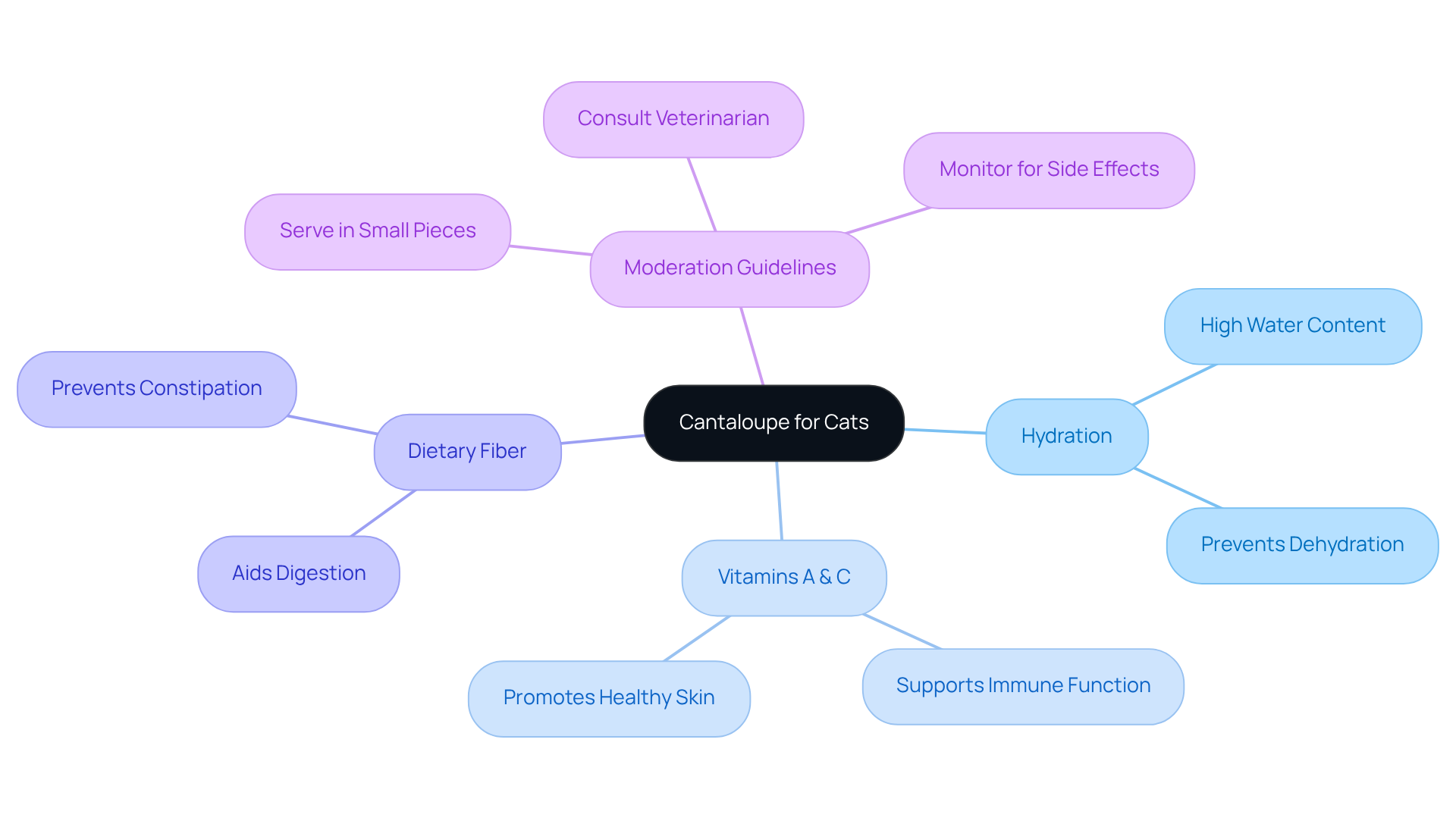
Identify Risks: Potential Health Concerns with Cantaloupe for Cats
Cantaloupe can serve as a safe occasional treat for your furry family members, but it’s essential to consider if can cats eat cantaloupe and be aware of certain risks associated with it. The fruit’s high sugar content can lead to weight gain and may exacerbate conditions like diabetes if consumed in large amounts. Additionally, some felines might experience digestive issues, such as diarrhea or vomiting, especially if they indulge in excessive amounts of melon. A case study has shown that the rind and seeds of melons pose choking hazards and may lead to gastrointestinal problems. Therefore, it’s vital to observe your cats closely for any adverse reactions after introducing melon into their diet.
Before adding new foods to your feline’s menu, consulting a veterinarian is crucial to ensure their health and safety. This is especially important given the concerning rise in obesity rates among cats, with 61% classified as overweight or obese. As Dr. Ernie Ward wisely notes, recognizing obesity in pets is the first step toward treating this condition. Proper guidance can help mitigate these risks and promote a balanced diet for your beloved companions.
Furthermore, always wash cantaloupes thoroughly to reduce pesticide exposure, and remember to remove the rind and seeds before considering if can cats eat cantaloupe. By taking these precautions, you can create a nurturing environment that supports your pet’s well-being.
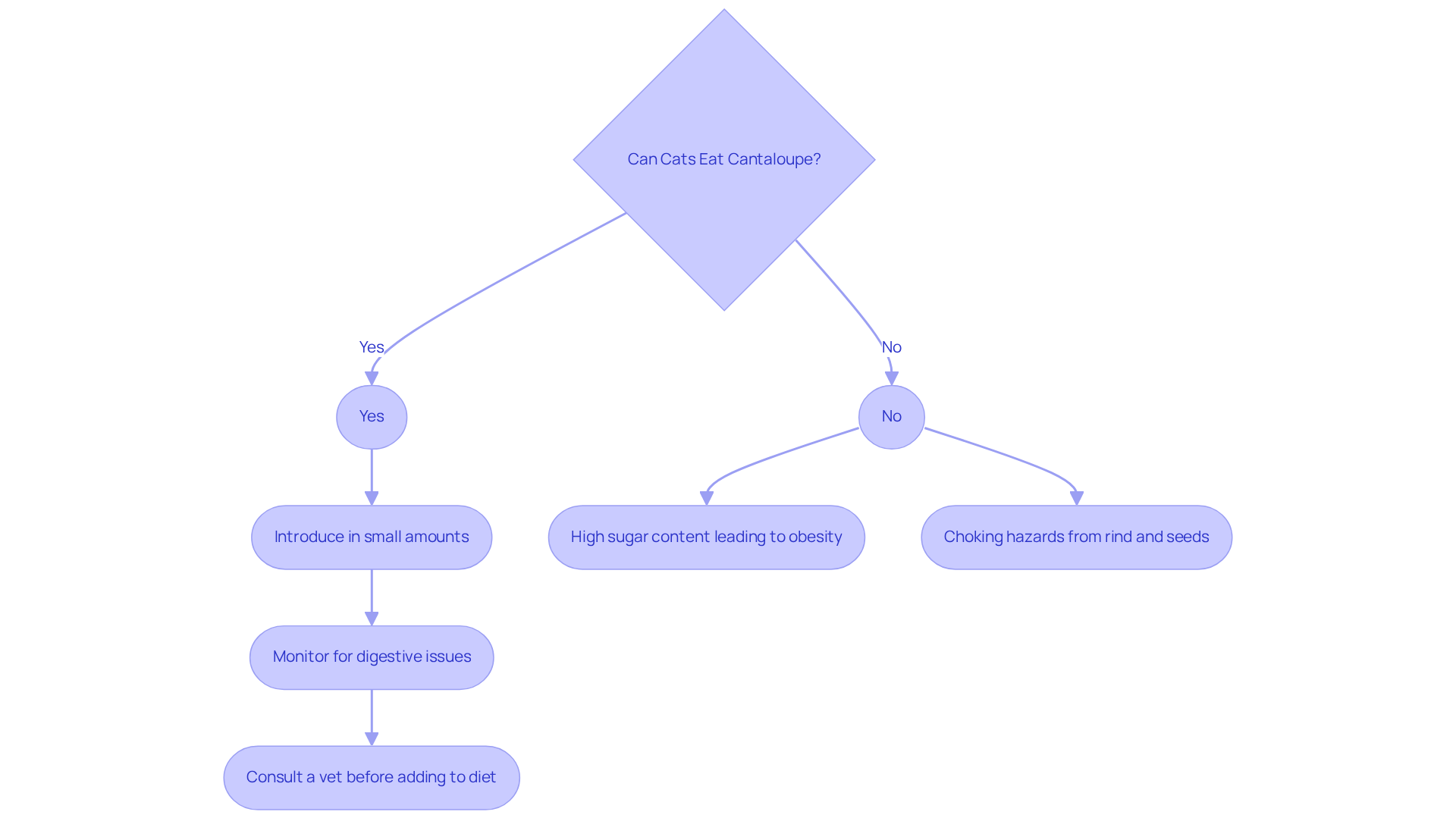
Conclusion
Cantaloupe can be a delightful addition to your furry family members’ diet when offered with care and moderation. This sweet melon not only provides hydration but also delivers essential vitamins and nutrients that can support your feline’s overall health. Understanding the safety measures and nutritional benefits associated with cantaloupe helps you make informed decisions that enhance your pets’ well-being.
As we explore this topic, it’s important to remember the significance of serving cantaloupe in small, manageable pieces. Ensure the seeds and rind are removed to prevent choking hazards. Given the fruit’s high sugar content, caution is warranted, especially for cats with existing health issues. By gradually introducing cantaloupe and monitoring for any adverse reactions, you can safely incorporate this refreshing treat into your cats’ diets.
Ultimately, the key takeaway is that cantaloupe can serve as a healthy and enjoyable snack for your beloved feline companions, provided it is given thoughtfully. Encouraging a balanced diet that includes occasional treats like cantaloupe can contribute to a happier and healthier life. Always prioritize consultation with a veterinarian to tailor dietary choices to individual health needs and ensure a nurturing environment for your pets.
Frequently Asked Questions
What is cantaloupe and its scientific name?
Cantaloupe, scientifically known as Cucumis melo, is a type of melon characterized by its sweet, orange flesh and netted skin.
Can cats eat cantaloupe?
Yes, many pet owners wonder if cats can eat cantaloupe, and it can be offered as a treat.
What are the nutritional benefits of cantaloupe for cats?
Cantaloupe is low in calories (about 53 calories per cup) and rich in essential vitamins A and C, dietary fiber, potassium, and antioxidants, which contribute to a cat’s overall health and well-being.
What is the water content of cantaloupe?
Cantaloupe has a high water content of approximately 90%, making it a good snack for hydration.
How can cantaloupe benefit my cat’s health?
Offering cantaloupe to your cat can provide a tasty treat along with essential nutrients that support healthy skin and vision.

